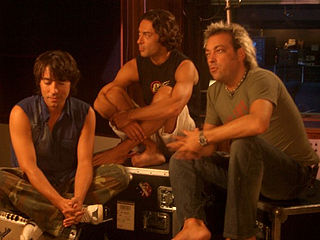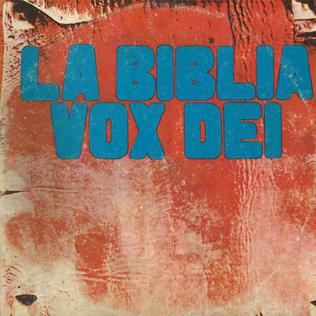
Vox Dei is an Argentine rock band credited for recording the country's first concept album, La Biblia. Their most prolific years were the 1970s, when they recorded ten albums.

Caliente is the name of the first album recorded by the Argentine rock band Vox Dei, issued in 1970, their only LP for "Mandioca".
Luis Segura, is a popular traditional Dominican singer who refers to himself as 'The Father of Bachata'. He is considered one of the best interpreters of traditional bachata with hits like "Pena por ti", "Dicen", and "No me celes tanto". Segura's first recordings were in the 1960s but it wasn't until his release of "Pena por ti" in the early 1970s that Segura hit stardom.

María del Socorro Tellado López, known as Corín Tellado, was a prolific Spanish writer of romantic novels and photonovels that were best-sellers in several Spanish-language countries. She published more than 4,000 titles and sold more than 400 million books which have been translated into several languages. She was listed in the 1994 Guinness World Records as having sold the most books written in Spanish, and earlier in 1962 UNESCO declared her the most read Spanish writer after Miguel de Cervantes.

Café Quijano is a Spanish pop rock band formed by three brothers, Manuel, Óscar, and Raúl Quijano, all of whom are singers. The brothers are originally from León, along with their father, who ran a musical pub called "La Lola" in the city centre, which gave name to one of their most well-known songs. Apart from publishing four successful albums, they presented galas, collaborated with Disney for soundtracks, and worked on a project with Castilla y León's image to promote tourism to the region.

Manuel Alexandre AbarcaOAXS MML was a Spanish film and television actor.

La Biblia is the second studio album by the Argentine band Vox Dei, released as a double album on March 15, 1971 by Disc Jockey Records. Considered a milestone of nascent Argentine rock, as well as one of the first rock operas and concept albums of rock en español, La Biblia centers on the Bible's narrative, starting from Genesis and concluding with the Apocalypse.

Cuero Caliente is the fourth album recorded by the Argentine rock band Vox Dei.

La Nave Infernal is the name of the fifth album recorded by the Argentine rock band Vox Dei, is the first live album from the group.

Vox Dei para Vox Dei is the seventh studio album by the Argentine rock band Vox Dei. It is the band's only album with Carlos Rodriguez on rhythm guitar.

Estamos en la pecera is the eighth album recorded by the Argentine rock band Vox Dei. First without Ricardo Soulé and is the only album with Carlos Michelini.

Gata de Noche is the tenth album recorded by the Argentine rock band Vox Dei. In this album, Ricardo Soulé returned to the band. It was Vox Dei's last album for the first era, until their break-up in 1981.

Tengo Razones para Seguir is the twelfth studio album by Argentine rock band Vox Dei. It represents the second album recorded after the return in 1986, to commemorate the 20th anniversary of Vox Dei.

Mis Canciones Preferidas 2 is the follow-up compilation album to Mis Canciones Preferidas from 1986 by Puerto Rican singer Yolandita Monge.

Jeremías Pies de Plomo is the third studio album by the Argentine rock band Vox Dei.

Ángel Magaña was an Argentine film actor who appeared in some of Argentina's notable films of the 1930s, 1940s and 1950s.
La Biblia Según Vox Dei en Vivo 1986 is the second live album by Argentine rock band Vox Dei. It was released in 1987 by B.B. Records, this was the group's first album in nine years.
Grupo Yndio is a Mexican band from Sonora founded in 1972, by some of the members of the dissolute Los Pulpos.
El Camino is the 13th studio album by Argentine rock band Vox Dei, released in 2005. It is the band's second album with Carlos Gardellini and its first release on the band's independent label, La Rompe Records. It is also Vox Dei's seventh line-up second full-length appearance since 1994, following the departure of Ricardo Soulé in 1998. The band presented and announced the new album on 22 July 2005, at the ND Ateneo Theatre, three months before the band ended the recording. Also, Vox Dei remade six songs for his previous albums.
This is the discography for Mexican pop singer Yuri.















